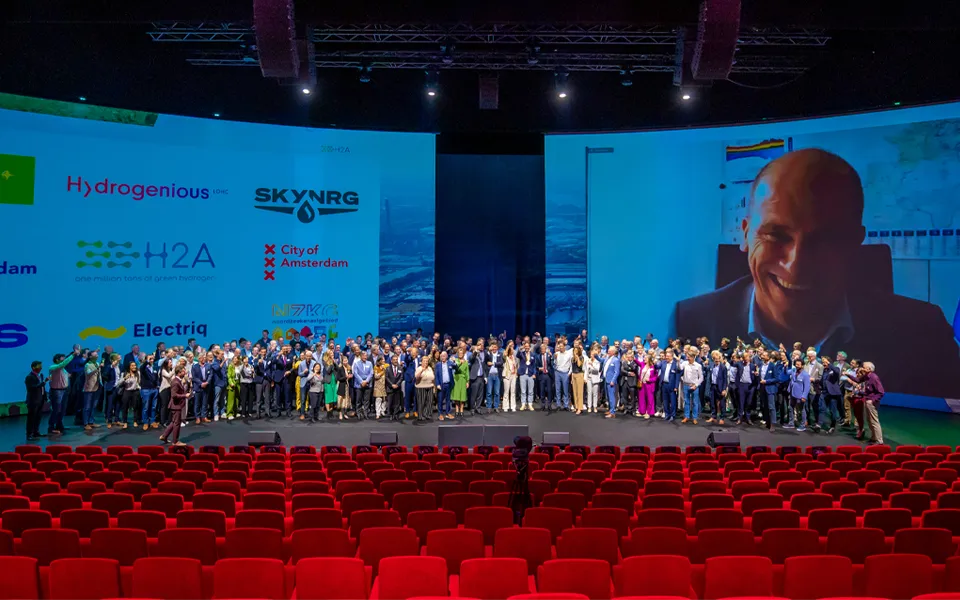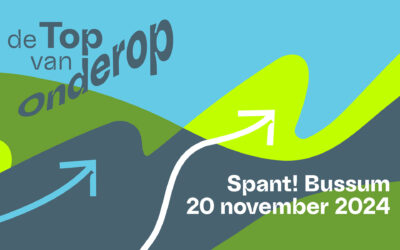H2A (Hydrogen to Amsterdam) was officially launched during a symposium held at Theater Amsterdam on 4 July 2023. The ‘Import(ance) of hydrogen: propelling the future’ symposium brought together all the diverse players involved in realising a green hydrogen import chain in Amsterdam. Some 250 people attended the conference, demonstrating the broad cross-sector support for fuelling change through green hydrogen.
Bron: Port of Amsterdam
It was the first time visionaries, politicians, knowledge institutes, terminals, producers, transporters, offtakers and ports appeared on one stage to explore the future of green hydrogen with Amsterdam as the hub for the North Sea Canal Area and the European hinterland. The symposium culminated with the H2A launch, with Diederik Samson leading the countdown and all the participants on stage to show their support for propelling the future of hydrogen.
Joining forces for the future of hydrogen
H2A is an international consortium with eight members spanning multiple links in the green hydrogen ecosystem. Its mission is clear: To bring about a green hydrogen supply chain by importing one million tonnes of 100% green hydrogen to and through the port of Amsterdam annually. Through an open platform, it provides a road to market and the infrastructure, assets and knowledge to create an end-to-end green hydrogen value chain. All participants agreed it can only be achieved through promoting collaboration, using existing infrastructure and accelerating development.
Collaboration is key
Earl Goetheer, CTO HighTechXL, said we can only tap into the power of hydrogen by working together: ‘Hydrogen is key to connecting our port to the future. We can only do this by working together in a different way. The only way ahead is to go forward together.’ Ramon Ernst, Managing Director of Evos, said H2A is all about building relationships across sectors and regions: ‘The H2A platform ensures we establish ties between all the relevant parties.’
Collaboration comes before competition in the field of green hydrogen, said Alice Krekt, Director NL Hydrogen: ‘In this case we don’t need competition, only collaboration. We’re all in this together.’ Government agencies and the business community must work much more in partnership to accelerate the creation of the green hydrogen chain as a vehicle for decarbonising.
Big number, big ambitions
The figure of importing one million tonnes of green hydrogen sets a clear goal. Dorine Bosman, CIO of Port of Amsterdam, said: ‘One million tonnes is a big goal, but it’s one people can rally around. It’s a large enough number to dream.’
While the million-tonne target seems ambitious, Misha Valk, Head of Capacity Development SkyNRG, put it into perspective: ‘We need eight million tonnes of green hydrogen by 2050 to make European aviation sustainable.’
Navigating the course to change
On course to achieving the ambitious goal, it’s important to have pioneers who lead the way by example. Brigit Gijsbers, Deputy Director General Civil Aviation and Maritime Affairs at the Dutch Ministry of Infrastructure and Water Management, said: ‘You need examples like Samskip to set the example for the rest of the shipping sector.’
Samskip has ordered two hydrogen powered vessels to provide service to its west European routes. They will be among the world’s very first zero emission container vessels. Kari-Pekka Laaksonen, CEO Samskip: ‘We are very proud to take the lead in pioneering the Sea Shuttle initiative. We believe hydrogen and fuel cells are the future of large and long-distance ships.’
In the industrial sector, Tata Steel is making a conscious decision to be ahead of the curve. Paul Vonk, H2 lead Tata Steel, foresees a circular future in which hydrogen is a driving force: ‘Now is a great time to be alive. We’re going clean and green. Tata is even going circular. There is so much to be done and you can feel the momentum. The use of hydrogen will be a big part of the energy transition. That’s why we’re actively partnering with every link in the value chain en route to the new hydrogen economy.’
Amsterdam has the puzzle pieces
Amsterdam is uniquely positioned to realise regional, national and international green hydrogen supply chains, largely thanks to the existing infrastructure. The port has suitable locations and infrastructure to receive, store and distribute Liquid Organic Hydrogen Carriers, Solid Inorganic Hydrogen Carriers and liquid hydrogen. The Amsterdam region is distinctive as it encompasses a seaport, Schiphol airport and large-scale industry. This means all the required infrastructure – terminals, pipelines and other systems – are already in place. The port furthermore has direct connections to three of the nine European transport corridors. This all combines to make Amsterdam perfectly situated as a hub for supplying green hydrogen to the northwest European hinterland.
Jurriaan de Jonge, Director Fuel KLM and General Manager Amsterdam Schiphol Pipeline, said demand for hydrogen also makes Amsterdam attractive. ‘The demand is here because of Schiphol and government incentives. Amsterdam has a lot going for it; many of the pieces of the puzzle are here. But we need to get hydrogen imports going.’
Ramon Ernst said infrastructure is vital in the transition process, ‘At Evos, our job is to provide the infrastructure solution. We aim to use existing infrastructure so we can get the hydrogen to the people who need it. We are also developing the required new infrastructure and are in the engineering phase of developing a hydrogen release plant.’
Ellen Ruhotas, Head of New Energy Products Zenith Energy Terminals, says infrastructure is a decisive factor: ‘Infrastructure is key. The impressive thing is that we have a supply chain here today that encompasses multiple locations and users.’
Stepping up our game
All the organisations, industries, sectors and academics agree that there is no time to lose, and that fast action is required. H2A must make concrete and swift progress towards getting hydrogen imports going and propelling the energy transition. Robust regulations, mandates and subsidies are also needed to fast-track the transition to green hydrogen.
Diederik Samson, Chief of Staff of Frans Timmermans and European Commission Executive Vice President, made an urgent plea to act now: ‘As Europeans, we are upping our game. We must ensure the demand for hydrogen is there. Industries have to be certain the hydrogen will be available.’ He called on everyone engaged in developing the green hydrogen value chain to: ‘Reassess your plans. Don’t be self-congratulatory but take decisive action. We need to step up our game.’



